RxJS: How to make an ordered mergeMap operator
An operator for when both concurrency control and ordering are important

The problem to solve
In one of my projects, I needed to assemble a PDF document where different pages came from different sources and the result document had to contain all of them in order. I used the pdf-lib for everything related to documents. With this library, I can create a new document, copy pages from another one then save the result as a buffer with some simple commands:
// create a document
const pdfDoc = await PDFDocument.create();
// source document
const pdf = // ...
// copy pages from pdf to pdfDoc
(await pdfDoc.copyPages(pdf, pdf.getPageIndices())).forEach((page) => pdfDoc.addPage(page));
// save the result document
await pdfDoc.save();
I had an async function that generated part of the result based on a config object. By calling this function with the different configs, I can generate the
fragments, then use the copyPages + addPage to combine them:
const generatePages = async (pageConfig) => {
// generate and return a PDF
const pdf = ...;
return await PDFDocument.load(pdf);
}
const pdfDoc = await PDFDocument.create();
// generate multiple pages
const pdf1 = await generatePages(pageConfig1);
const pdf2 = await generatePages(pageConfig2);
// ...
// copy all of the to pdfDoc
(await pdfDoc.copyPages(pdf1, pdf1.getPageIndices())).forEach((page) => pdfDoc.addPage(page));
(await pdfDoc.copyPages(pdf2, pdf2.getPageIndices())).forEach((page) => pdfDoc.addPage(page));
// ...
await pdfDoc.save();
The problem was that the generatePages ran slow and I wanted to parallelize it. The obvious solution is to use a Promise.all with an async map
and run all the generatePages concurrently.
const pageConfigs = [...];
// generate all the input pages
const pdfs = await Promise.all(pageConfig.map(generatePages))
// build the result
const result = await pdfs.reduce(async (pdfDocProm, pdf) => {
const pdfDoc = await pdfDocProm;
(await pdfDoc.copyPages(pdf, pdf.getPageIndices())).forEach((page) => pdfDoc.addPage(page));
return pdfDoc;
}, PDFDocument.create());
await result.save();
The above solution also takes advantage of an async reduce to build the result page in a serialized way.
There are two problems with this solution. First, it runs all generatePages in parallel. I used Puppeteer to generate the PDF from HTML and that is
memory-heavy. In practice, I could run 3-5 at a time, any more would use up all the available memory and the whole process would be a lot slower due to
swapping.
The second problem is that it generates all the input PDFs before it starts to assembly the result document. This added more memory pressure, so I was looking for a solution that has a controllable amount of concurrency and produces elements when they become ready and in order.
RxJS mergeMap
The mergeMap, also known as flatMap, is a natural choice that came into my mind for this. It supports Promises and thus async functions nicely, and
it has a third parameter that sets the number of parallel calls. Whenever a task is finished, it starts a new one immediately, but never more than the
concurrency cap.
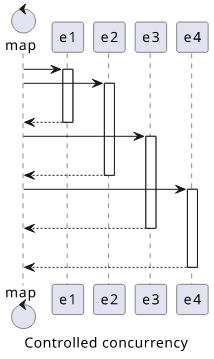
This yields a nice structure:
// whops: not ordered
const result = await rxjs.from(pageConfigs).pipe(
// generate pages, 3 at a time
rxjs.operators.mergeMap(generatePages, 3),
// build the result document as inputs become available
rxjs.operators.reduce(async (pdfDocProm, pdf) => {
const pdfDoc = await pdfDocProm;
(await pdfDoc.copyPages(pdf, pdf.getPageIndices())).forEach((page) => pdfDoc.addPage(page));
return pdfDoc;
}, PDFDocument.create()),
).toPromise();
The above solution ticks the managed concurrency checkbox as well as it builds the result document when the inputs become available. But unfortunately,
mergeMap emits elements as they are ready and does not keep the original ordering of elements.
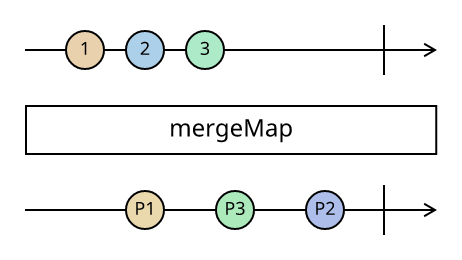
This results in a document that has its pages out-of-order, which is wrong.
Another RxJS operator, concatMap preserves the ordering, but it has no support for setting the amount of concurrency. It seems like there is no built-in
operator to support this use-case.
Fortunately, it's not hard to use existing operators to create new ones. The operator below is an orderedMergeMap that emits the elements in-order and
also supports setting the concurrency.
orderedMergeMap
Here's the implementation that gets a Promise-producing mapper (an async function, usually) with a concurrency setting:
const orderedMergeMap = (mapper, concurrency) => rxjs.pipe(
rxjs.operators.mergeMap(async (input, index) => [await mapper(input), index], concurrency),
rxjs.operators.scan(({lastEmittedIndex, results}, [result, idx]) => {
const emit = [...results, {result, index: idx}].map((result, _, list) => [
result,
[...Array(result.index - lastEmittedIndex - 1).keys()].map((i) => i + lastEmittedIndex + 1)
.every((i) => list.find(({index}) => index === i) !== undefined)
]);
return {
emitting: emit
.filter(([result, emit]) => emit)
.map(([result]) => result)
.sort((a, b) => a.index - b.index)
.map(({result}) => result),
lastEmittedIndex: Math.max(
lastEmittedIndex,
...emit.filter(([result, emit]) => emit).map(([{index}]) => index)
),
results: emit
.filter(([result, emit]) => !emit)
.map(([result]) => result),
};
}, {emitting: [], lastEmittedIndex: -1, results: []}),
rxjs.operators.flatMap(({emitting}) => emitting)
)
Since it's a pipeable operator, use it like any built-in one, passing the function and parallelization setting:
const result = await rxjs.from(pageConfigs).pipe(
// generate pages, 3 at a time
orderedMergeMap(generatePages, 3),
// build the result document as inputs become available
rxjs.operators.reduce(async (pdfDocProm, pdf) => {
const pdfDoc = await pdfDocProm;
(await pdfDoc.copyPages(pdf, pdf.getPageIndices())).forEach((page) => pdfDoc.addPage(page));
return pdfDoc;
}, PDFDocument.create()),
).toPromise();
In the above example, it feeds the reduce operator with the results in-order, no matter how long it takes for the generatePages to provide them.

How it works
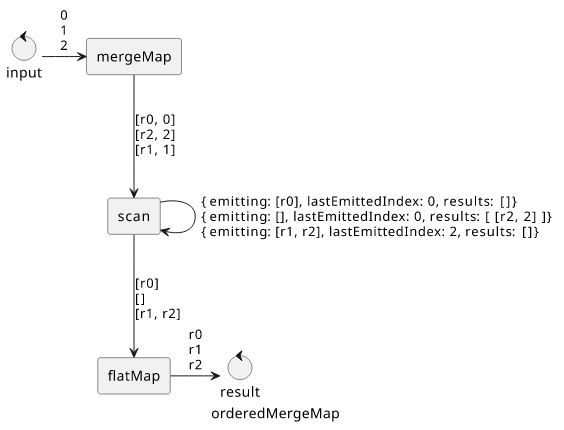
Internally, it uses 3 operators.
rxjs.operators.mergeMap(async (input, index) => [await mapper(input), index], concurrency),
First, a mergeMap calls the mapper function and it controls the concurrency. It also adds the index to the result, so that later operators know the
original ordering of the elements.
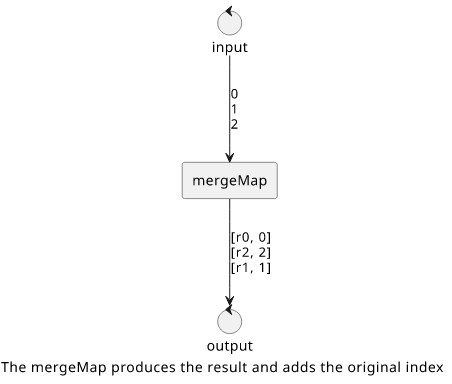
Then a scan with a flatMap (=mergeMap) structure that allows storing intermediate values as the result of the scan and also emitting
multiple items.
rxjs.operators.scan(({state}, item) => {
// use stat
return {
emitting: [], // flatMap will emit these elements
state: ..., // state for the next element
}
}, {emitting: [], state: undefined}, 3),
rxjs.operators.flatMap(({emitting}) => emitting)
This is a useful structure in many situations where you don't want to use local variables. The result of the previous scan is fed back to
the next invocation, and anything that it returns in the emitting array will be extracted and emitted by the flatMap.
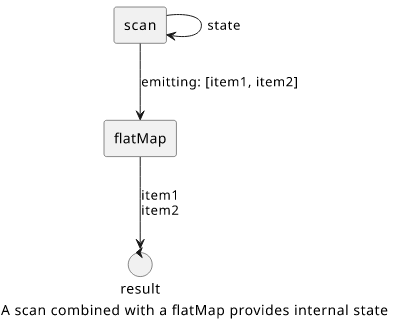
This structure moves all interesting logic inside the scan operator. It needs to keep track of the last element it emitted (the lastEmittedIndex)
and all the results that are out-of-order (results). The latter is a buffer for elements that need to wait for a previous result before they can be
emitted.
rxjs.operators.scan(({lastEmittedIndex, results}, [result, idx]) => {
// mark elements as in-order or out-of-order
const emit = [...results, {result, index: idx}].map((result, _, list) => [
result,
[...Array(result.index - lastEmittedIndex - 1).keys()].map((i) => i + lastEmittedIndex + 1)
.every((i) => list.find(({index}) => index === i) !== undefined)
]);
return {
// emit in-order elements sorted by their index
emitting: emit
.filter(([result, emit]) => emit)
.map(([result]) => result).sort((a, b) => a.index - b.index)
.map(({result}) => result),
// move the last index
lastEmittedIndex: Math.max(
lastEmittedIndex,
...emit.filter(([result, emit]) => emit).map(([{index}]) => index)
),
// the buffer of out-of-order elements
results: emit
.filter(([result, emit]) => !emit)
.map(([result]) => result),
};
}, {emitting: [], lastEmittedIndex: -1, results: []}),
The implementation seems complicated, but it boils down to the emit array. It contains all results with a flag whether they can be emitted (all previous
items are emitted) or not (waiting for a previous result). Then the emitting array in the result is the elements sorted by their original index that can
be emitted, the lastEmittedIndex is the internal state to keep track of which elements were passed to the flatMap, and the results is the
items that are still waiting.
Conclusion
The orderedMergeMap operator provides a way to control the concurrency of the mergeMap while also preserving the ordering of the elements. The
implementation above uses only standard RxJS operators.
There are other solutions for this problem too, most using a local variable to store the out-of-order elements.


 An example is available on GistRun
An example is available on GistRun




